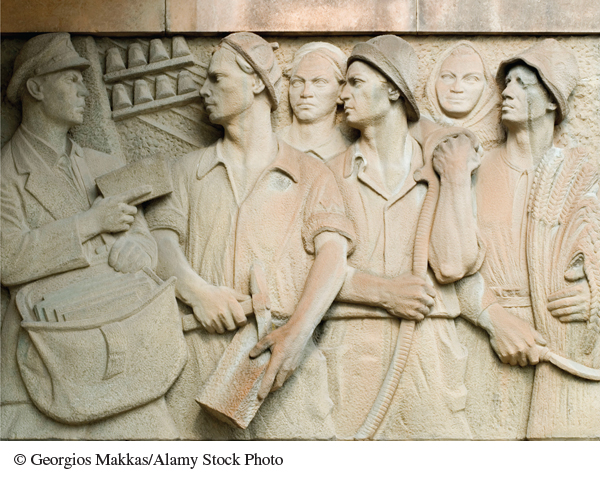A History of Western Society: Printed Page 942
A History of Western Society, Value Edition: Printed Page 903
A History of Western Society, Concise Edition: Printed Page 943
Introduction for Chapter 28
28
Cold War Conflict and Consensus
1945–1965
The defeat of the Nazis and their allies in 1945 left Europe in ruins. In the immediate postwar years, as Europeans struggled to overcome the effects of rampant death and destruction, the victorious Allies worked to shape an effective peace accord. Disagreements between the Soviet Union and the Western allies emerged during this process and quickly led to an apparently endless Cold War between the two new superpowers — the United States and the Soviet Union. This conflict split much of Europe into a Soviet-
Amid these tensions, battered western European countries fashioned a remarkable recovery, building strong democratic institutions and vibrant economies. In the Soviet Union and the “East Bloc” (the label applied to central and eastern European countries governed by Soviet-
Cold War conflicts notwithstanding, the postwar decades witnessed the construction of a relatively stable social and political consensus in both Communist and capitalist Europe. At the same time, changing class structures, new migration patterns, and new roles for women and youths had a profound impact on European society, laying the groundwork for major transformations in the decades to come.▪

CHAPTER PREVIEW
Why was World War II followed so quickly by the Cold War?
What were the sources of postwar recovery and stability in western Europe?
What was the pattern of postwar development in the Soviet bloc?
What led to decolonization after World War II, and how did the Cold War influence the process?
How did changes in social relations contribute to European stability on both sides of the iron curtain?
Chronology
| 1945 | Yalta Conference; end of World War II in Europe; Potsdam Conference; Nuremberg trials begin |
| 1945–1960s | Decolonization of Asia and Africa |
| 1945–1965 | United States takes lead in Big Science |
| 1947 | Truman Doctrine; Marshall Plan |
| 1948 | Foundation of Israel |
| 1948–1949 | Berlin airlift |
| 1949 | Creation of East and West Germany; formation of NATO; establishment of COMECON |
| 1950–1953 | Korean War |
| 1953 | Death of Stalin |
| 1954–1962 | Algerian War of Independence |
| 1955 | Warsaw Pact founded |
| 1955–1964 | Khrushchev in power; de- |
| 1956 | Suez crisis |
| 1957 | Formation of Common Market; Pasternak publishes Doctor Zhivago |
| 1961 | Building of Berlin Wall |
| 1962 | Cuban missile crisis; Solzhenitsyn publishes One Day in the Life of Ivan Denisovich |
| 1964 | Brezhnev replaces Khrushchev as Soviet leader |